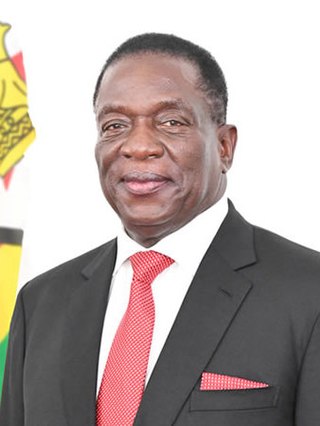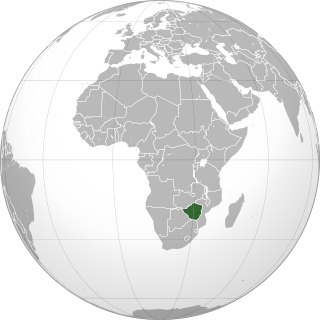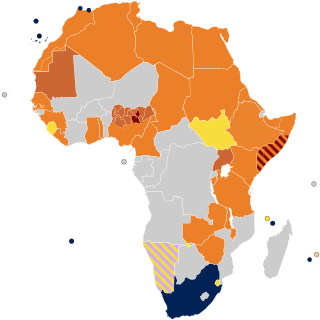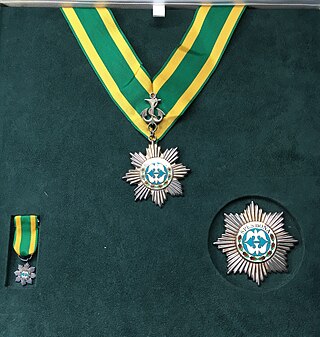Until roughly 2,000 years ago, what would become Zimbabwe was populated by ancestors of the San people. Bantu inhabitants of the region arrived and developed ceramic production in the area. A series of trading empires emerged, including the Kingdom of Mapungubwe and Kingdom of Zimbabwe. In the 1880s, the British South Africa Company began its activities in the region, leading to the colonial era in Southern Rhodesia.

Zimbabwe maintains relations with various countries around the world, and maintains close diplomatic relations with neighboring nations.

Benoni is a town on the East Rand, Gauteng, South Africa, some 26 kilometres (16 mi) east of Johannesburg, within the City of Ekurhuleni municipality.

Allan Aubrey Boesak is a South African Dutch Reformed Church cleric, politician and anti-apartheid activist. He was sentenced to prison for fraud in 1999 but was subsequently granted an official pardon and reinstated as a cleric in late 2004.

Professor Arthur G.O. Mutambara is a multifaceted leader, academic, and technology expert currently serving as the Director and Full Professor of the Institute for the Future of Knowledge (IFK) at the University of Johannesburg (UJ) in South Africa. Renowned for his expertise in robotics, academia, Pan-Africanism, and technology strategy, he is a pivotal figure in shaping the future of knowledge and technological advancement. At IFK, Professor Mutambara leads the Decentralised Artificial Intelligence and Control Systems (DAICS) Research Group, driving groundbreaking research initiatives. He also spearheads the African Agency in Public Health (AAPH) initiative within the Future of Health (FoH) Research Group, demonstrating his commitment to leveraging technology for societal well-being. In addition to his academic responsibilities, Professor Mutambara is deeply involved in teaching Control Systems at both UJ's Mechanical Engineering and Electrical and Electronic Engineering Departments, imparting knowledge and fostering innovation among students.

Emmerson Dambudzo Mnangagwa is a Zimbabwean politician who is serving as President of Zimbabwe since 24 November 2017. A member of ZANU–PF and a longtime ally of former President Robert Mugabe, he held a series of cabinet portfolios and was Mugabe's Vice-President until November 2017, when he was dismissed before coming to power in a coup d'état. He secured his first full term as president in the disputed 2018 general election. Mnangagwa was re-elected in the August 2023 general election with 52.6% of the vote.

Lesbian, gay, bisexual, and transgender (LGBT) people in Zimbabwe face legal challenges not experienced by non-LGBT residents. Since 1995, the Government of Zimbabwe has carried out campaigns against LGBT rights. Sodomy is classified as unlawful sexual conduct and defined in the Criminal Code as either anal sexual intercourse or any "indecent act" between consenting adults. Since 1995, the government has carried out campaigns against both homosexual men and women.

Joseph Wilfred Msika, was a Zimbabwean politician who served as Second Vice-President of Zimbabwe from 1999 to 2009.

Didymus Noel Edwin Mutasa is a Zimbabwean politician who served as Zimbabwe's Speaker of Parliament from 1980 to 1990. Subsequently, he held various ministerial posts working under President Robert Mugabe in the President's Office. He was Minister of State for Presidential Affairs from 2009 to 2014 and also served as ZANU-PF's Secretary for Administration.

David Coltart is a Zimbabwean lawyer, Christian leader and politician. He was a founding member of the Movement for Democratic Change when it was established in 1999 and its founding secretary for legal affairs. He was the Member of Parliament for Bulawayo South in the House of Assembly from 2000 to 2008, and he was elected to the Senate in 2008. He was the Minister for Education, Sport, Arts and Culture from February 2009 until August 2013. He is a top official of the Citizens Coalition for Change political party which was formed in 2022.

Lesbian, gay, bisexual, and transgender (LGBT) rights in Africa are generally limited in comparison to the Americas, Western Europe and Oceania.
The second round of voting in the Zimbabwean presidential election of 2008 was held between Robert Mugabe and Morgan Tsvangirai after the first round failed to produce a 50% majority for either candidate. The election process was marred by violence against and intimidation of voters and party workers, which eventually led to the withdrawal of Tsvangirai from the poll. This left Mugabe as the winner of, effectively, a one-candidate election.

The 2008–2009 Zimbabwean political negotiations between the opposition Movement for Democratic Change, its small splinter group, the Movement for Democratic Change – Mutambara, and the ruling Zimbabwe African National Union – Patriotic Front were intended to negotiate an end to the partisan violence and human rights violations in Zimbabwe and create a framework for a power-sharing executive government between the two parties. These negotiations followed the 2008 presidential election, in which Mugabe was controversially re-elected, as well as the 2008 parliamentary election, in which the MDC won a majority in the House of Assembly.

The 7th Parliament of Zimbabwe was a meeting of the Zimbabwean Parliament, composed of the Senate and the House of Assembly. It met in Harare over five sessions from 25 August 2008 to 27 June 2013. Its membership was set by the disputed 2008 Zimbabwean general election, which resulted in a ZANU–PF majority in the Senate and Movement for Democratic Change – Tsvangirai control of the House of Assembly. Political negotiations resulted in the 2009 Government of National Unity, a coalition government composed of ZANU–PF, the MDC–T, and the MDC–M.

The African Free Trade Zone (AFTZ) is a free trade zone announced at the EAC-SADC-COMESA Summit on 22 October 2008 by the heads of Southern African Development Community (SADC), the Common Market for Eastern and Southern Africa (COMESA) and the East African Community (EAC). The African Free Trade Zone is also referred to as the African Free Trade Area in some official documents and press releases.

Morgan Richard Tsvangirai was a Zimbabwean politician who was Prime Minister of Zimbabwe from 2009 to 2013. He was president of the Movement for Democratic Change, and later the Movement for Democratic Change – Tsvangirai (MDC–T), and a key figure in the opposition to former president Robert Mugabe.

The Order of Good Hope or Order of the Cape of Good Hope is a dormant order of merit of the Republic of South Africa.

The Southern Cross is a South African monthly Catholic magazine, which from 1920 to 2020 was the only Catholic weekly in the country. It is published independently but with the support of the Southern African Catholic Bishops Conference. First published on 16 October 1920, it appeared uninterrupted every week until 23 September 2020, after which the publication transitioned into a monthly magazine. The current editor-in-chief is Günther Simmermacher.

General elections were held in Zimbabwe on 29 March 2008 to elect the President and Parliament. Because of Zimbabwe's dire economic situation, the elections were expected to provide incumbent President Robert Mugabe with his toughest electoral challenge to date. Mugabe's opponents were critical of the handling of the electoral process, and the government was accused of planning to rig the election. Human Rights Watch said that the election was likely to be "deeply flawed."

GALZ An Association of LGBTI People in Zimbabwe is an organisation established in 1990 in Harare to serve the needs of the lesbian, gay, bisexual, transgender and intersex (LGBTI) community in Zimbabwe. GALZ's vision is "a just society that promotes and protects human rights of LGBTI people as equal citizens in Zimbabwe".


















